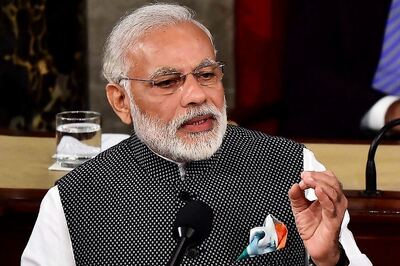
views
‘I want to die’ was etched on the small slip of paper by a 12th-standard student a few days back. He had done badly in the Joint Entrance Examination (JEE) and his dreams had apparently crashed. He was looking down at the floor all the time while talking to me. “Joining IIT was the dream of the entire family and I did so well in the mock tests”, he further continued. He had tears in his eyes and his family also wept with him. I listened to them attentively and gently asked the boy, “What are your other options dear?” and very feebly he gave me a million options! Slowly, as the grief spilt, the options lightened up as the rays of the sun and the moon fell on them. In the course of the chats, he suddenly said, “Did Arjun not see only the eye of the fish and aimed at it?” Many pose this question to me and my answer here is that we need to have a sharp focus on a goal, but obsessive focus and preoccupation make us blind to many other beautiful roads that are available and always leads to frustration and distress. Such disturbed focus is seen in families that are isolated, authoritative, strongly hierarchical, feudal obsessed with reputation and those who have grossly unrealistic expectations. In life, there are always multiple targets and the choice depends upon a million reasons. The fog in the mind needs to be cleared to see the entire landscape of chances. The world has hugged pluralism and countless possibilities as a philosophy in all fields and careers are no exception.
So a mistake all students make is to forget the most important maxim in their journey on the Earth i.e. ‘life is always about options.’ There are no made-to-order products. The choice is not about the ‘absolute’ but of the ‘relative’, i.e. one among the many. I may choose to go to Delhi by Rajdhani, but I will keep options open if I fail to board the train for whatever reason. In my opinion, one single exam on a particular day is an unfair test for which students, in some states, practice since school days. A physical ailment, bad sleep, a small bout of fever, minor hassles at home, a bad stomach or any difficult circumstance around the time of the entrance exams can mar the performance. No entrance exam can test the all-around aptitude of the students for the course they compete for.
As the results of the 12th standard and the entrance exams are released, students and parents need to be very careful not to throw in the towel after a failure, as retired Justice Shrikrishna once remarked years ago that though the competition has increased, the cake of opportunities has multiplied many folds. There have been many deaths due to suicides in several states after the recent results of the 12th standard exams. Many of them could have been prevented if emotional health would have been focussed upon across the years from childhood.
Those who get very depressed share with me that they have let down their parents. They also feel that they look small in front of their peers, relatives and teachers. Shame, sadness, fear and anger are predominant emotions experienced. But these can be prevented if across life, they are able to manage small rejections such as low performance in tests, break up with friends or loved ones, denial of wants by parents and a trillion others. Life is never full of yeses but also many nos. Those who can manage and are taught to tackle rejections in childhood can resolve scholastic failures in their later teens. In an era of globalisation, parents get very upset when little kids cry, forgetting that experiencing small pain in childhood prepares them to face bigger pains in later life. Stress inoculation is a must. The World Mental Health Report 2022 clearly states that physical and mental health should get equal priority!
Hence, all the big buck coaching classes and colleges should mandate ‘well-being’ as much as the coaching in engineering, medical and other subjects. IITs are slowly veering to the fact that the subject of humanities needs to be increasingly emphasised in engineering courses. On my trip to Kota, a few years back to study the suicides among students, I found that the classes had punishing schedules and senior government officers would take a transfer to Kota for the benefit of their own children. One owner of a famous class spoke to me about Bhagwat Saptah he was organising in the city, when I asked him about the suicides. There was apathy and the city looked like a big factory where commercialisation outstripped compassion and well-being was compromised at the altar of promising the sky to the students.
Just before the big-ticket results are declared, students need to be talked to by parents and teachers. The four Psychological needs of students are:
Emotional Safety and Security
Students should perceive that their families will accept them exactly as they are and if things go wrong, they will hug them a little longer and a little stronger. Parents can get upset at the drop in performance but they can join hands with the children to find solutions and promote healing. Needless to say that the students cannot procure made-to-order parents from Amazon or elsewhere.
Respect
Students need to perceive respect from their parents and their teachers. True self-esteem of educational institutions does not depend upon the toppers but the collective sense of well-being of the entire institution.
Trust
Students should feel that they are trusted, to be inspired. In the 1990s, I would say, ‘Trust your children completely’ but in the 21st century, I have modified it to, ‘Trust your child completely but keep your eyes open.’
Love
Love is the last ingredient that adds flavour to safety, trust and respect.
In India, 95 percent of educational institutions do not have mental health services. Lay mental healthcare workers need to be trained for the lakhs of students across the country. Successful experiments with such workers have been conducted in Uganda and Zambia in partnership with community leaders, schools and NGOs. In Islamabad, a psychological intervention called Problem Management Plus (PM +) complements the programme by specialists. In Maharashtra, the Atmiyata approach uses trained community volunteers to identify, support and counsel community members with common mental health conditions. Sangath, an NGO from Goa, has been using trained lay mental health volunteers in their projects in Goa and Delhi. Such services need to be constantly supervised and can complement the Specialist Services.
ICALL, a project of TISS, has come up with a helpline that can benefit students. Supported by UNICEF, the toll-free number 1800-2222-11 works between Monday to Saturday between 10 am to 6 pm and services are available in English, Hindi, Bengali and Tamil. The Government of India’s Tele Manas helpline 14416 and 1- 800 891 4416 can be of great help to save lives.
Yet, one needs to understand that the minds that telescopically focus on a single goal go into a state of shock when the performance stands far away from the desired objective. All teachers need to be hovering around holding hands of such children to help them open their blindfolds so that they can see the glow of the universe that provides them with a trillion highways of success. Such an exercise should begin days before the results till the high-risk students for mental health problems settle down. Periodic screening of all students proactively from the age of 12 can help prevent deaths due to self-harm and treat those who are in distress.
If any student talks about running away, expresses a single death wish, feels hopeless, worthless, has sleep and appetite issues, is irritable or lazy, avoids friends and family, lies about his results, is violent, consumes alcohol or addictive substances, is tearful and sad, she/he should be seen by a psychiatrist immediately.
The seeds of resilience need to be sowed very early in children to help them face the turbulent world in their teens. Families should realise that the mothers have given birth to a child alone and not a child with a mark sheet. Parents who share their goof-ups early in life at home help students share bad news early thereby preventing catastrophes. I, as a parent, have been sharing three statements with children:
‘Life is beautiful’
‘Exams are easy’
‘You are awesome’
It’s time families and educational institutions help children look at options from the beginning, manage rejections and prioritise mental health across their journey of life.
Dr Harish Shetty is a Psychiatrist and has been working with students across three decades and conducts sessions in educational institutions regularly. Views expressed are personal.


















Comments
0 comment